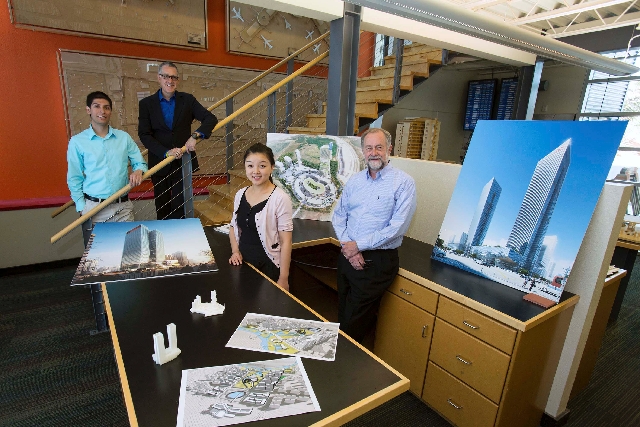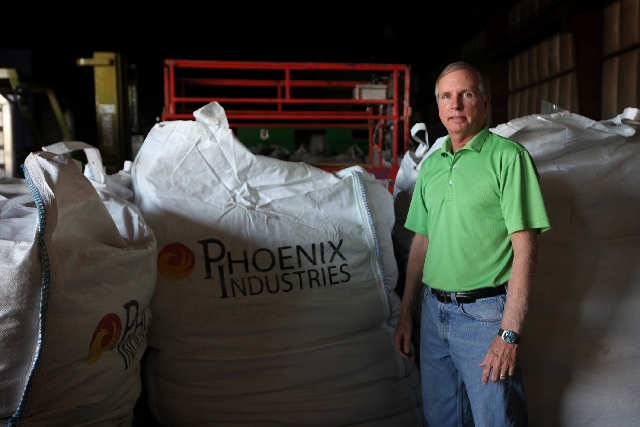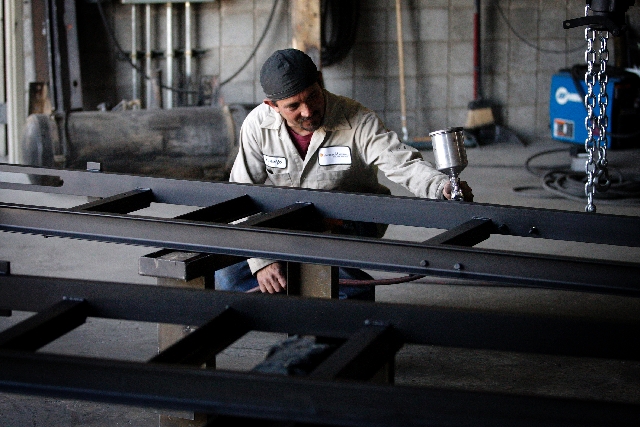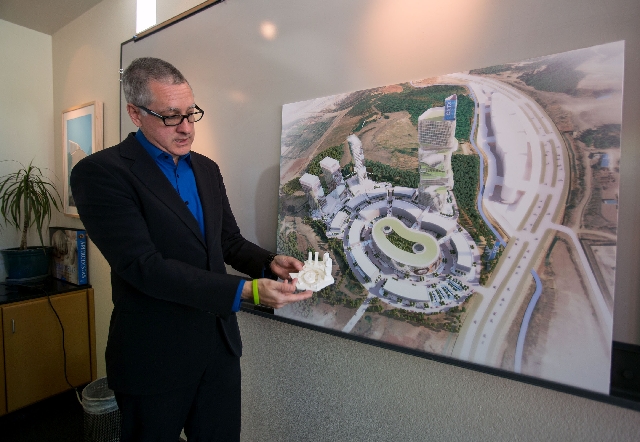ExporTech program helps Las Vegas businesses compete worldwide
When Tate Snyder Kimsey was founded in 1960 as George G. Tate & Associates, the architectural firm specialized in designing public schools and government buildings in Nevada.
Fifty-three years later, the Henderson-based company is doing business in China, and hopes to do more.
Tate Snyder Kimsey, a privately held firm with 80 employees, has gone further than most Las Vegas nongaming companies in pursuit of new markets.
It established a sales and design office in Shenzhen in 2011 before moving it to Shanghai. Its portfolio in China includes the 100-story Bay Technology High-Rise Towers in Shenzhen and the Zhonghang International Plaza, a luxury hotel and office tower, said to be the tallest building in Nanchang.
J. Windom Kimsey, president of the firm, is looking to double overseas business, to 40 percent of annual revenues.
“We sell an idea and vision,” Robert Boyle, a principal with the firm, told company executives, bankers, business owners and government officials during a recent ExporTech presentation at the University of Nevada, Las Vegas.
ExporTech is a major element in the state’s efforts to help Nevada companies go global.
But sometimes international business happens by accident.
Boyle recently said that while on vacation in 2010 he met several Chinese developers and officials, which led to Tate Snyder Kimsey applying to do design work on buildings in Shenzhen.
“Our interest in expanding overseas started as a fluke three years ago,” he said. “We thought ‘we are just a Henderson-based firm, who cares (about) us? The firms we will be competing with are well-known internationally.’”
It took the firm almost a year to break into the Chinese market. Boyle said the firm did it by spending a lot of time there.
“We make 13 trips to China every year,” he said. “Because, if they don’t see you, they’ll forget your face.”
The firm is currently working on three projects in China.
STATE PROVIDES EXPORT GRANTS
To help defray the cost of promoting its architectural business in southern China, Tate Snyder Kimsey has applied for government grants. Last year, the firm received a $12,500 Nevada State Trade and Export Promotion (STEP) grant to expand its efforts in China.
The Governor’s Office of Development issued $33,300 in grants last year to three companies. A total of $160,000 was made available for Nevada business by the U.S. Small Business Administration.
“We are a bit of an odd duck,” Boyle said. “We are a service organization. We (wondered) if this program was right for us.”
With half of all construction worldwide taking place in China, both Boyle and Kimsey know they need a workable plan to achieve the firm’s five-year goal of doubling its business there.
The firm turned for help to ExporTech, which was developed by Nevada Industry Excellence.
Terry Culp, deputy director of NIE in Las Vegas, said that since ExporTech’s launch in 2009 about 28 companies have completed the program.
Culp said NIE holds separate annual ExporTech training sessions in Las Vegas and Reno. The program was developed by the Manufacturing Extension Partnership and the U.S. Export Assistance Centers of the U.S. Department of Commerce to assist companies to export goods and services. It is offered in collaboration with state trade offices and regional export experts nationwide, he said.
“We are considering holding another one in the fall because of the strong demand,” Culp said.
Additional information about ExporTech is available online at www.nevadaie.com.
Culp said the program assists companies in developing an export plan. Most implement their plans within six months.
Participating companies sent four employees each to three daylong ExporTech seminars, held in February, March and April. Between seminars the companies worked with a coach, a project manager from Nevada Industry Excellence and a paid intern from the Lee School of Business at UNLV to develop their export plan.
Companies pay a base tuition of $2,500 to participate in ExporTech, but with state grants it’s reduced to $1,500.
Participants in ExporTech spent most of the first session, on Feb. 15, designing an export strategy and trying to define the obstacles and risks of exporting their products. The seminar included discussions of market research, targeting market selection and manufacturing and growth challenges.
The second session, on March 13, focused on finances, export controls, legal issues, intellectual property and finding representatives or distribution partners.
Companies presented their plans to an expert panel April 17.
BUSINESS HAS PLAN FOR CHINA
In his presentation, Boyle said education and housing are still underfunded sectors, with lots of opportunities for architects in China.
He said the firm intends to bid for design work on projects in smaller Chinese cities, with an average population of 8 million and a need for everything from housing to auto malls to office buildings.
The firm’s China strategy also calls for establishing relationships with local design institutes, improving banking relationships and reducing or eliminating the need to enter design competitions.
Kimsey said bidding on projects can be a big investment with minimal return.
“We are usually the only U.S. competitor,” Kimsey said. “It’s a good bit of risk.”
The firm still had a lot to learn about Chinese regional tax rates and improving payment transfers to the U.S.
Boyle said the firm’s customers have paid everything they owe to date, but the challenge is wiring the money back faster. A simple change in procedures, he said, could improve profitability in China by 10 percent.
However, the problems are worth the reward. Tate Snyder Kimsey earned $25,000 in fees in its first year in China, $500,000 last year, and expects to earn almost $1 million in 2013.
Following his 15-minute presentation, Boyle stood at the head of the class as the five-member panel and his fellow classmates took turns questioning his business plan.
Mel Jameson, director of international initiatives at the Lee Business School, suggested Tate Snyder Kimsey might want to rank Chinese cities in order of priority, while making a financial commitment to hire a native speaker.
Jameson said the “biggest problem is building on relationships you already have” in Shenzhen and other cities.
EXPORT GROWTH THIRD IN U.S.
Building overseas business relationships is responsible for an uptick in Nevada exports last year. While gold is still king, agricultural goods, data processing and coin-operated games helped push exports higher.
Nevada’s exports in 2012 totaled $10.2 billion, while 2,504 companies exported their goods and services, according to data compiled by the U.S. Department of Commerce. The Silver State’s largest market is Switzerland with exports topping $3.7 billion, followed by India ($1.8 billion), Canada ($1.4 billion), China ($561 million), and Mexico ($330 million).
Switzerland still tops the list because of precious metals exports. Chinese exports, for example, were up 32 percent last year, and although mining was a portion of it at 7 percent, Nevada had a 262 percent increase in electrical components, a 250 percent increase in agriculture exports and a 6,900 percent increase in digital automatic data processing.
Overall, Nevada ranked third in export growth of any state last year at 28 percent, the Commerce Department said. New Mexico, 42 percent, and Arkansas, 36 percent, captured the top two spots.
Primary metal manufacturers accounted for $5.4 billion; computer and electronics products, $1.4 billion; miscellaneous manufactured commodities, $995 million; minerals and ores, $959 million; and machinery, except electrical, $243 million. Companies in Las Vegas accounted for $1.7 million in exports last year.
Most of the local companies in ExporTech focus their efforts on the rapidly growing “BRIC” nations — Brazil, Russia, India and China.
Phoenix industries, which participated with Tate Snyder Kimsey, Brock Racing Enterprises, Sable Systems and Pictographics in the most recent ExporTech training, is no exception.
“Our goal is to export our products to Brazil and Mexico,” said Frederico Bastos, sales manager with Phoenix Industries, a waste tire recycling and asphalt rubber paving company based in North Las Vegas. On Tuesday, Phoenix Industries shipped its first container of asphalt paving equipment to Brazil.
Culp said each company was at a different stage of doing business overseas — from beginner to advanced — when the three-month program began in February.
“We are a technology company that recycles tires turning it into asphalt rubber for roadways,” Bastos told about 50 attendees on April 17.
“It’s a very small niche (business) that we produce a quality product for.”
He said Brazil, which is preparing for the 2014 FIFA World Cup and 2016 Rio Olympic Games, is a key market for Phoenix Industries. Bastos said the company will initially export everything from its North Las Vegas facility, but its long-term goal is to establish a facility in Brazil.
Phoenix Industries manufacturers pellets from recycled tires used to create asphalt rubber for highways, driveways, parking lots and playgrounds. The company also makes entire recycling plants and truck-mounted asphalt blending equipment.
Bastos said Phoenix Industries will attend two trade shows in Brazil this year, and is developing brochures and a website in Portuguese.
“Brazil is developing its infrastructure (for the World Cup and Olympics) making it a prime time to enter the market,” Bastos said.
Contact reporter Chris Sieroty at
csieroty@reviewjournal.com or 702-477-3893. Follow @sierotyfeatures on Twitter.




















